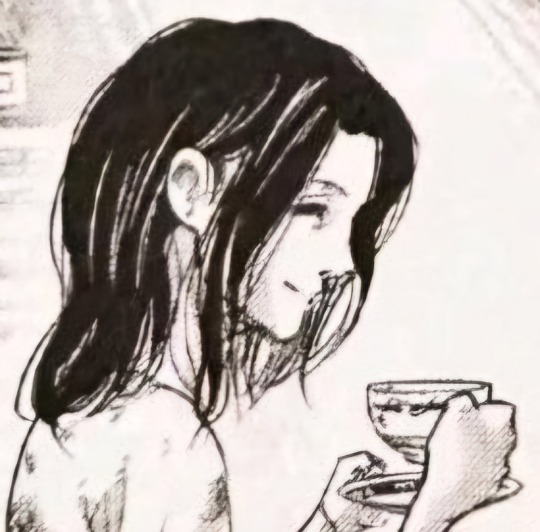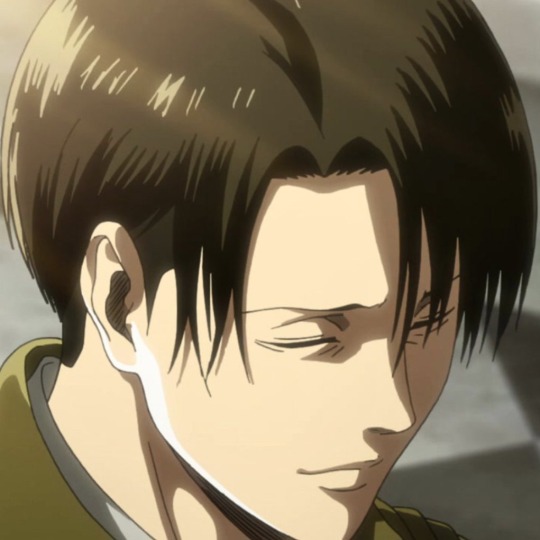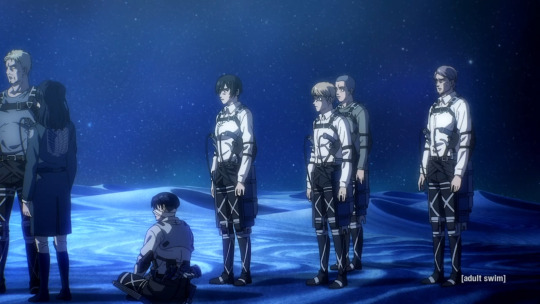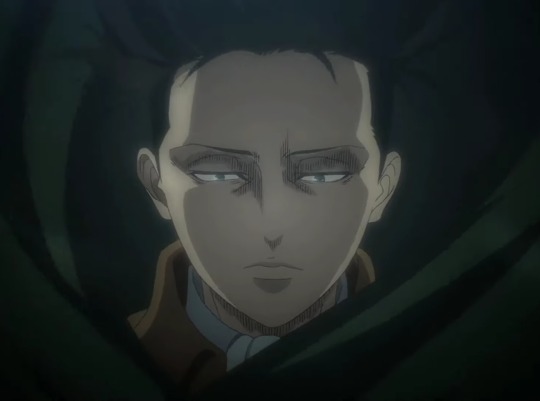#aot.text
Explore tagged Tumblr posts
Note
Why did Levi killed the last guy? I mean did he have to kill him? Was that guy really trying to keep Levi safe and out of harm or he had other intentions?
Hi! Thanks for the question!
The last guy with the glasses was part of the same group of men that were brutally beating Levi and trying to sell him into sexual slavery. He stood there and watched the entire time, as a young child (which is the only way Levi can be described here) was almost beaten to death.
He did not care about Levi, and he was not trying to save him. The reason he claimed as such is because this man was trying to convince Levi not to kill him because, after witnessing Levi’s power, he had no doubt that Levi would be capable of it. In fact, he even threatens Levi with a fate worse than death, implying that Levi would deserve it for defending himself by killing the men who were assaulting him. This man had fully intended on selling Levi into sexual slavery before Levi had awakened his powers.
What’s more disgusting still is that this man used Levi’s clear affection for his mother (given that Levi risked his life attempting to get back her tea set) to try and convince Levi that Levi’s mother would have hated him and been disappointed in his actions. All this man wants is to save his own ass. He’s truly despicable.
#levi ackerman#aot bad boy#attack on titan#shingeki no kyojin#shingeki no kyoujin#asks#aot.text#text.levi#c: levi ackerman#my thoughts
77 notes
·
View notes
Text
I’m also not okay. He clearly inherited so much from his mom. He’s a spitting image of her. They both love tea, and Levi most clearly remembered her elegance—he has that same elegance. He has a classy style of dress (consider his famous cravat), and he’s always neat and put together.
Guys I'm sobbing he has his mom's smile.


levination i'm not okay
3K notes
·
View notes
Text
Levi, Emotional Expression, and Social Interaction
I've seen different posts on Levi lately across different platforms that claim he is a cruel or mean person, which are fundamental misunderstandings of his character. I sort of see the problem as people mistaking Levi's emotional expressions (or lack thereof) as indicative of malicious intent or rude behavior. As such, I wanted to discuss how Levi's history and trauma have shaped how he expresses himself and relates to others. Once one has an understanding of that, it becomes evident that Levi's expressions should not be used to judge his intentions or feelings.
I wrote another post on how Levi fully meets the criteria for post-traumatic stress disorder (PTSD) on my main blog, and that diagnosis is important for understanding Levi as a character, as he's someone who's been largely affected by his trauma. To further expand on that post, we're going to discuss both Levi's affect and his ways of socially interacting with others, using concepts such as social modeling and self-monitoring.
What is Emotional Affect?
Affect, in psychology, refers to a patient's expression of emotion. Expression of emotion encompasses facial expressions, gestures, body language, tone of voice, etc. Mood, on the other hand, refers to the internal state of a patient's emotions sustained over a period of time. Affect helps us interpret a person's mood; however, there are such situations where affect can be considered inappropriate—that is, the person's affect is not entirely congruent (i.e., consistent) with the person's present mood and/or situation. A classic example of inappropriate affect would be laughing at a funeral, as that is incongruent with the context of the situation. Another example—a patient who is smiling and laughing after being involuntarily committed is considered to have an inappropriately euphoric affect.
Affect can be described across multiple dimensions, but the two most typically used are the quality of affect and the range of affect. Quality of affect is typically categorized as either euthymic (normal), dysthymic (depression, anxiety, guilt), or euphoric (an abnormally elevated sense of well-being, such as in mania). The range of affect can be labeled as labile, broad, restricted, blunted, or flat. Broad is considered the normal range of affect.
For the purposes of conciseness, we're going to focus on blunted and flat affects, as those are the range of affects that are best suited to describing Levi. Flat affect is when there is no variation in the patient's emotional expressions, regardless of their mood and situation. Blunted affect is similar, but it is a bit less severe—it means minimal variation. Practically, what do these mean?
Levi's Affect
When Kenny first finds Levi as a child, Levi is in a severe state of neglect; he is dying of starvation, he is wearing rags, his hair is unkempt, and he is sitting in the same room as his mother's decaying corpse. A typical child in this developmental range would be in extreme distress: crying, expressing fear, pleading for help, etc. However, Levi shows no such displays of emotions; he does not cry, he does not move, and he barely speaks. In fact, there is absolutely zero emotional expression, and there is no indicator he is upset about his situation (even as it is clear he must be). This is flat affect. Even in the short montage we see after Kenny has taken Levi under his "care", Levi never once shows variation in his emotional expression—no anger, no laugher, nothing.
Once Levi is an adult during the present timeline in the series, Levi exceedingly rarely displays his emotions. He often speaks in monotone, minimally varying the tone or volume of his voice—never yelling as well, even when angry. His smiles are so rare that it's a notable moment when he does smile (such as when Historia punched him at end of the "Royal Government" arc), and he never cries even after significant personal losses (except his one tear at the end of the series). His affect as an adult ranges from flat to blunted. This is significant too because we do know that his mood does vary, as it's clear from his verbal and body language the toll that different events take on him, and he does also display a sense of humor across the series. Again, though, his emotional expression does little to reflect how he's feeling.
What Causes Flat Affect?
To give a quick list of the most common causes:
Schizophrenia and other psychotic-spectrum disorders
Brain damage, such as from organic brain pathology or a traumatic brain injury
Neurodevelopmental disorders, such as autism spectrum disorder (ASD)
Severe psychological trauma, typically resulting in post-traumatic stress disorder
Major Depressive Disorder (MDD)
I will say outright that there is no evidence Levi suffers from schizophrenia, and thus, that is unlikely to be the cause of his flat/blunted affect, especially given the onset of Levi's flat affect and the exceeding rarity of childhood-onset schizophrenia. Similar reasoning applies to brain damage, so both of those can be excluded from the differential.
I do believe Levi meets the criteria for MDD in adulthood; however, that would be more so a comorbidity of his existing PTSD. Levi looked to be around 4-6 years of age at the start of Kenny's flashbacks, and MDD in that age group is quite uncommon, even when accounting for childhood-onset and adolescent-onset depression.
This leaves us with both severe psychological trauma and ASD as the two most likely causes of Levi's flat affect as a child and through adulthood. ASD can be a valid interpretation of Levi's significantly reduced affect display during childhood, as well as his consistent social difficulties throughout all of canon. Based on criteria laid out by the latest edition of the Diagnostic and Statistical Manual of Mental Disorders (DSM-5-TR), Levi can be seen as having ASD (which I'll likely make a future post on). However, the presence of severe psychological trauma confounds this diagnosis. Despite this confounding diagnosis, it is still possible he has both PTSD and ASD.
Regardless, the most likely explanation for Levi's range of affect remains severe psychological trauma. In a child that young, something had to have gone extremely wrong in his early upbringing for his significantly reduced affect display. An entire separate post can be written on this topic, but Levi demonstrates clear signs of an insecure attachment style by the time he's discovered by Kenny; this indicates that Kuchel, despite having loved Levi, was simply unable to properly care for him, and this resulted in deep and ingrained psychological trauma that affected Levi's ability to socially relate and interact with others for the rest of his life. I intend on going into more detail in a separate post, but Levi's attachment style is likely insecure-avoidant or insecure-disorganized.
Observational Learning and Social Modeling
Albert Bandura's social learning theory posits that children learn through a combination of traditional behaviorist processes (classical and operant conditioning), cognitive processes, in addition to observation and modeling. In reference to Levi, observational learning is the most salient aspect of this theory.
In simple terms, observational learning refers to the way children observe the people around them. Individuals observed are referred to as models. Models can include, but are not limited to, parents/caregivers, TV characters, school teachers, and friends within a peer group. Basically, children pay attention to these models and encode their behavior into their memory. At a later time, this behavior is then imitated. This is referred to as "social modeling".
Who were Levi's models? Kuchel, Kuchel's patrons at the brothel she worked at, Kenny, and others who lived in or frequented the Underground City.
Given Kuchel's circumstances and the danger of human trafficking in the Underground, it is likely she taught Levi to avoid interacting with anyone in order to ensure his safety. Kuchel's patrons, in all likelihood, abused her and Levi was most assuredly witness to this abuse or the effects of it in some way. Then, Kenny—Levi's most significant parental figure—was a prominent serial killer who displayed and actively taught Levi violence.
All of this points to Levi never having had the opportunity to learn proper social interaction. In fact, he was actively taught inappropriate and unhealthy ways to socially interact. Not only was Levi's emotional development stunted and severely impacted as shown through his lack of affect, but his ability to socially interact and relate to others was inhibited due to both his insecure attachment and the absence of appropriate social models. How does this manifest in Levi?
Self-Monitoring
Self-monitoring is the degree to which people monitor and adjust their self-presentations when interacting with others and across different social contexts. Whether someone is a high or low self monitor can be affected by their natural personality, their experiences growing up, and/or their neuropsychobiology.
High self monitors tend to be actively aware of the social image they are projecting, and they will be adept at responding to social cues. They will also vary the image they project dependent upon who they are interacting with and what the social circumstances are. They have greater concern over situational appropriateness, and they are often perceived as more friendly and pleasant by others.
In contrast, low self monitors tend to exhibit emotional expressiveness and social responses more congruent with their internal states regardless of social context. That is, they do not adjust their beliefs, attitudes, and dispositions to be more socially acceptable. As such, they are often perceived as rude, socially awkward, and/or unaware of others' social needs.
Levi is a low self monitor. Regardless of who he is interacting with or what the situation is, he consistently maintains the same attitudes and beliefs; he is always honest and says what he's feeling. He never adjusts his social tone, even when it would make him more appeasing to others. Throughout the series, he's often referred to as rude, socially awkward, a lunatic, etc. for his inability to self-monitor. This is a likely a result of the aforementioned psychological trauma, his lack of appropriate social models, his innate introverted nature, and his potential ASD.
Summary
My goal with this post was to explain how Levi's trauma and experiences growing up have formed the way he expresses himself and interacts with others. Levi never sets out to be seen as rude, unkind, or cruel. In fact, I'd say he is by far the kindest and most compassionate character in all of Attack on Titan. However, because of his social disposition, he is consistently misperceived by both characters in the series, as well as readers/viewers. Levi, through a combination of his innate nature and the environment in which he grew up, simply lacks the social skills and affinity for social interaction to properly explain himself and come across as more palatable to others.
Note: I am a doctor of psychology student, so much of this information has been informed by my schooling.
#attack on titan#shingeki no kyojin#levi ackerman#aot#snk#attack on titan meta#shingeki no kyojin meta#Levi Ackerman meta#aot.text#aot.meta#my thoughts#c: levi ackerman#meta.levi#text.levi
127 notes
·
View notes
Text
Info
This is an Attack on Titan and Levi-centric sideblog. My main/personal blog for all other matters is @darkskywishes. I write meta about Attack on Titan and Levi, and I reblog other AoT and Levi-related posts. I'm a psychology doctoral student, so I often use that knowledge to inform my posts.
Name: You can call me Sky
Age: 27
Pronouns: She/Her/Hers
I like posts, follow, and reply from my main blog.
Regarding ask messages, I love receiving them and I’m happy to answer! It might take me some time to answer, though, as I am chronically ill/disabled and working on a doctorate. I promise I’m not ignoring anyone. All ask messages are tagged #asks.
All of my contributions are tagged #my thoughts. All meta posts are tagged #aot.meta. All shorter text-based posts are tagged #aot.text.
8 notes
·
View notes
Text
Damn, you're right. I think this really demonstrates the extremity of the pain he was in, given (1) how athletic Levi normally is and (2) how Levi always works himself to literal exhaustion, if we look back to the "Return to Shiganshina" arc. The fact he hadn't done any fighting yet, but he was there sitting in this situation speaks volumes about the wrecked state of his body. Poor Levi. I wanna hug him. And yes, he does look adorable.

i love how levi just sits down in this scene
the poor guy's probably in so much pain, all things considered, but he looks adorable just sitting there in the paths. He probably watched the others running for ages and figured he would make himself comfortable
981 notes
·
View notes
Text
Hahahaha it's true though XD
Armin giving Levi orders as a new commander:
Go after that titan.... Sir. *sweats profusely*.
570 notes
·
View notes
Text
Levi’s humor is underrated. I love how sarcastic he is.




I love his salty ass
#aot.screenshots#screenshots.levi#screenshots.zeke#aot.text#text.levi#c: levi ackerman#c: zeke yeager#my thoughts
446 notes
·
View notes
Text
What absolutely kills me about this scene is that Levi doesn’t even look afraid—despite being surrounded by about 30 abnormal titans. Any other person would view this as their personal last moments. No, Levi looks resigned here (as was stated), and not because he thinks he’s about to die. No, instead, he knows two truths: (1) he’s going to have kill his precious comrades and (2) he’s going to survive because he has to. Nothing pains Levi more.
I think this scene, more than any other, exemplifies how Levi’s strength is a curse. It’s weaponized against him again and again—the height of that curse being this very moment, where he’s forced to turn his strength against those he cares about. By the end, he outlives almost everyone he’s ever loved; he’s the last remaining Survey Corps veteran.

This look, this haunting look of resignation sticks with me always. We see Levi hesitate, really internally grapple with what he knows he ultimately has to do. The whole scene wrenches my heart, because it's so obvious how painful this decision was for him.
Ultimately, Levi still had a job to do. There was no saving his comrades, those he cared so deeply for.
If he were to let himself be eaten here, if he had hesitated any longer, Zeke could never be brought to justice. Levi had to at least do that for them. For all of them.
372 notes
·
View notes
Text
I’m the same way. I can’t handle all the ableism that gets leveled against post-war Levi. People are literally speaking badly about a man who sacrificed everything, including his body, to save the world and then somehow using that fact against him. His disabilities are a sign of his strength. It was never his Ackerman powers that made him Humanity’s Strongest, but the strength of his character and compassion. If someone doesn’t like post-war Levi, then they never liked Levi in the first place. His disabilities are a reflection of his immense selflessness and heroism.
Am I the only one who gets, like, protective over postwar Levi? Yeah I get like that over any Levi anytime he gets hate but when I see someone shit on postwar Levi (It's always for stupid reasons) I get extra mad. I would go to war for that man lmao.
244 notes
·
View notes
Text
Same, speaking as a wheelchair user myself. There's honestly so little representation in media of disabled characters who use mobility aids—especially main characters. I think it's such a big deal that Levi, one of the core characters of AoT, is the one that ends up disabled. It makes it less easy to brush aside the disability than if it were a random side character that doesn't really matter to the story.
It's particularly significant as well that Levi was known primarily by others for his immense physical prowess, but the fact that we still see him making a difference at the end of the series—disabilities and all—demonstrates that he was never actually defined by his abilities. He's still the same person, whether he's in a wheelchair or not. He got his disabilities from saving others and the world, so really, his disabilities are the mark of his strength. They're not something to be ashamed of; being disabled is not shameful.
It's why I hate it so much when I see people erase his disabilities post-canon or when I see all the ableism rampant in the fandom because I think his disabilities are important to acknowledge, not just for the representation, but because they mean something to his character.
Levi being disabled and using a wheelchair in the AOT finale means so much to me actually. Having a character who's been so defined by his physical ability (humanity's strongest) end up disabled and it not being a bad thing is just so refreshing to see as a disabled person who also uses mobility aids. And the fact that he's still making a positive difference in the world! He isn't defined by being disabled! Love to see it
164 notes
·
View notes
Note
I personally do think that Levi actively desired death in this moment. He details how he never expected he’d be able to retrieve his mother’s tea set and that he knew it was reckless. He expected to die as a result; it’s not simply that he was willing to die in the process if it meant succeeding. (1) He didn’t think he’d succeed, and (2) he believed with an almost certainty that he would die.
It wasn’t a simple risk of death is my point—it was practically guaranteed he would die when he originally planned to do this. I believe that Levi wanted his last moments to be filled with the impression he had of his mother, which he proclaims was the one good thing he ever had. Even if his life was filled with despair, he wanted to be closer to his mother in death.
Hey there, so I saw your analysis and I think it was really well done 💕!
The only thing I didn’t particularly agree on was whether or not Levi was suicidal. I don’t think that’s something we can say for certain and it’s not my interpretation of his thought process. I think he was a kid who just wanted the last piece of his mother and didn’t care if that meant rebellion or death or spitting on the shitty world as he said. I don’t think he wanted death. I think he just wanted the last piece of his mother. Just my interpretation though! Of course we are all entitled to see it how we want as the only person who really knows is Isayama.
But anyway great analysis write up I really enjoyed reading it as I so often do when it comes to your write ups.
I don't think Levi was actively seeking to die, but he also didn't care if he DID die, that's my point. Which, in my book, qualifies him for suicidal ideation. He was so bereft in his life, so without hope, that to him, a single act of defiance against the ugliness of the world was worth more to him than his continued existence. That's what I mean when I say Levi was suicidal. Not that he was trying to die, but that he was okay with it if he did. He didn't value his own life enough to fight for it with everything he had.
18 notes
·
View notes
Text
Yep, and I’ve read that the title “Bad Boy” also comes from how Kuchel originally viewed Levi as one. I’m not sure about the accuracy of that, but if it’s true, I’m not sure I’ll emotionally recover. And honestly, the psychological consequences of Kuchel dying because she gave all her food to Levi after learning to love him and stop neglecting him… I wouldn’t be surprised if Levi has an eating disorder or other severe psychological issues surrounding food. He would likely view him eating as the direct cause of his mother’s death.
Levi probably also views himself as a curse at this point, bringing death to those who love him. Hell, even Kenny died right after showing Levi a moment of kindness/compassion by giving him the titan serum.
This is heartbreaking stuff. What a horrific childhood. Levi is a true miracle.
I really can't deal with these "Bad Boy" spoilers. I'm gonna' actually lose it, man. I knew it would be sad, but I didn't think it would be this sad.
88 notes
·
View notes
Text

Zeke’s actions in the forest are particularly unforgivable because he knew exactly the impact they would have on Levi, as demonstrated by the above panel. He specifically set out to use Levi’s compassion against him, and he found the suffering it would cause funny—given he was mocking him for it and laughing.

This look, this haunting look of resignation sticks with me always. We see Levi hesitate, really internally grapple with what he knows he ultimately has to do. The whole scene wrenches my heart, because it's so obvious how painful this decision was for him.
Ultimately, Levi still had a job to do. There was no saving his comrades, those he cared so deeply for.
If he were to let himself be eaten here, if he had hesitated any longer, Zeke could never be brought to justice. Levi had to at least do that for them. For all of them.
#I have nothing more profound to add#except#fuck Zeke#I hate that guy lol#thank you for your additions as usual cosmic#c: zeke yeager#c: levi ackerman#aot.text#text.levi#text.zeke#my thoughts
372 notes
·
View notes
Note
Yes, exactly! And similar to the way Levi killed Isabel’s attackers in order to protect her from being raped (which was the heavy implication in the No Regrets manga), Levi killed this man to protect other children from suffering the way he did. I want to make it clear too that Levi is not acting as a decider of justice here; he’s simply acting both in self-defense and with the intention to protect others. Levi never went into this situation with the desire to kill—in fact, he had fully expected to die himself. Levi’s initial despondence and his later tears after the teacup breaks indicate that he was deeply traumatized by the act of killing.
Why did Levi killed the last guy? I mean did he have to kill him? Was that guy really trying to keep Levi safe and out of harm or he had other intentions?
Hi! Thanks for the question!
The last guy with the glasses was part of the same group of men that were brutally beating Levi and trying to sell him into sexual slavery. He stood there and watched the entire time, as a young child (which is the only way Levi can be described here) was almost beaten to death.
He did not care about Levi, and he was not trying to save him. The reason he claimed as such is because this man was trying to convince Levi not to kill him because, after witnessing Levi’s power, he had no doubt that Levi would be capable of it. In fact, he even threatens Levi with a fate worse than death, implying that Levi would deserve it for defending himself by killing the men who were assaulting him. This man had fully intended on selling Levi into sexual slavery before Levi had awakened his powers.
What’s more disgusting still is that this man used Levi’s clear affection for his mother (given that Levi risked his life attempting to get back her tea set) to try and convince Levi that Levi’s mother would have hated him and been disappointed in his actions. All this man wants is to save his own ass. He’s truly despicable.
77 notes
·
View notes
Note
Perfectly said! This man literally says, as Levi is about to get severely beaten by one of the other men in his group, “Hey… What happened to selling him?” He was upset at the prospect of Levi dying simply because he wanted to make a profit off of selling Levi into sexual slavery.
Levi was definitely very intuitive and intelligent when he immediately recognized this man was simply trying to manipulate him. The man definitely deserved what he got, as he would have likely gone on to traffic other children if Levi hadn’t killed him.
Why did Levi killed the last guy? I mean did he have to kill him? Was that guy really trying to keep Levi safe and out of harm or he had other intentions?
Hi! Thanks for the question!
The last guy with the glasses was part of the same group of men that were brutally beating Levi and trying to sell him into sexual slavery. He stood there and watched the entire time, as a young child (which is the only way Levi can be described here) was almost beaten to death.
He did not care about Levi, and he was not trying to save him. The reason he claimed as such is because this man was trying to convince Levi not to kill him because, after witnessing Levi’s power, he had no doubt that Levi would be capable of it. In fact, he even threatens Levi with a fate worse than death, implying that Levi would deserve it for defending himself by killing the men who were assaulting him. This man had fully intended on selling Levi into sexual slavery before Levi had awakened his powers.
What’s more disgusting still is that this man used Levi’s clear affection for his mother (given that Levi risked his life attempting to get back her tea set) to try and convince Levi that Levi’s mother would have hated him and been disappointed in his actions. All this man wants is to save his own ass. He’s truly despicable.
77 notes
·
View notes
Note
100%, especially to your last point. There’s a reason “suicide by cop” (when a person deliberately provokes a law enforcement officer into killing them) is a known phenomenon. Suicide does not need to occur by one’s own hand to count as a suicide, and Levi’s situation in “Bad Boy” is similar to the aforementioned phenomenon.
Hey there, so I saw your analysis and I think it was really well done 💕!
The only thing I didn’t particularly agree on was whether or not Levi was suicidal. I don’t think that’s something we can say for certain and it’s not my interpretation of his thought process. I think he was a kid who just wanted the last piece of his mother and didn’t care if that meant rebellion or death or spitting on the shitty world as he said. I don’t think he wanted death. I think he just wanted the last piece of his mother. Just my interpretation though! Of course we are all entitled to see it how we want as the only person who really knows is Isayama.
But anyway great analysis write up I really enjoyed reading it as I so often do when it comes to your write ups.
I don't think Levi was actively seeking to die, but he also didn't care if he DID die, that's my point. Which, in my book, qualifies him for suicidal ideation. He was so bereft in his life, so without hope, that to him, a single act of defiance against the ugliness of the world was worth more to him than his continued existence. That's what I mean when I say Levi was suicidal. Not that he was trying to die, but that he was okay with it if he did. He didn't value his own life enough to fight for it with everything he had.
18 notes
·
View notes